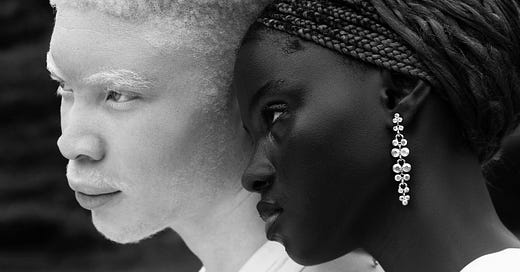Invisible lives: Dear Proctor & Gamble
A chance encounter reveals the harsh realities faced by albinos in Africa and reminds us that dignity begins with seeing, listening, and acting.
The scent of freshly cut grass, the brilliance of stars in the night sky, and the caress of a gentle breeze on a sweltering afternoon, these simple pleasures define the essence of life. Yet, for many, such moments are overshadowed by harsh realities.
I first noticed her at church, a small figure, unmistakably different. She was escorted by a 14-year-old child who had seen her struggling and instinctively reached out to help. Her appearance lingered in my mind: a woman in her sixties, an albino, legally blind, draped in a weathered white gown that had seen better days.
The next day, driven by something deeper than pity, I set out to find her. It wasn’t hard; people like her often occupy the edges of society, hiding in plain sight. When I did find her, I started by dropping off small sums of money for food. She was hesitant at first, silent but present. With time, her silence softened, and she finally spoke.
She didn’t ask for much. She didn’t ask for clothes or shelter. All she wanted... was a toothbrush.
That simple request hit me like a wave. In a world where self-care is often taken for granted, here was a woman for whom a toothbrush was a distant luxury.
I bought one immediately, along with toothpaste. I gently applied the paste for her and took her somewhere private, shielding her from the gaze of onlookers. She bent forward slowly, and when she spat, the foam was not white—it was crimson red. Her gums had gone so long without care, they bled with the shock of attention.
I stood there frozen, trying to remain composed as she straightened up and smiled—a fragile, almost imperceptible smile that held both pain and gratitude. That moment marked the beginning of something deeper than charity. It was the beginning of witness. Of truth.
Albinism, a genetic condition characterized by the lack of melanin, affects individuals' skin, hair, and eyes. In Africa, where darker skin tones predominate, those with albinism often stand out, making them targets for discrimination and violence.
According to the United Nations, individuals with albinism face severe forms of discrimination and violence, especially in regions where superstitions and myths prevail. They are often stigmatized, excluded from communities, and denied basic rights such as education and healthcare .
In some cultures, harmful beliefs perpetuate the idea that albino body parts possess magical properties. This has led to heinous acts, including mutilations and killings. The Office of the United Nations High Commissioner for Human Rights reported close to 800 cases of such attacks across 28 African countries since 2006 .
The woman I met represents countless others whose stories remain untold. Their struggles underscore the urgent need for societal change. Organizations like Amnesty International have highlighted the compounded threats to albinos' lives, emphasizing the denial of basic rights and the pervasive exclusion they face .
Procter & Gamble, with its global influence and commitment to social responsibility, is uniquely positioned to champion this cause. By raising awareness, supporting initiatives aimed at protecting albinos, and promoting inclusive practices, P&G can play a pivotal role in challenging the myths and prejudices that endanger lives.
The encounter with that resilient woman serves as a stark reminder of the injustices faced by albinos in Africa. Their plight is not just a human rights issue but a call for collective conscience and action.
Let us strive for a world where every individual, regardless of their genetic makeup, is afforded dignity, respect, and equal opportunities. Together, we can illuminate the path toward inclusivity and justice.
Want to donate to a good cause? Reach me via email - Aremuayomidem.o@gmail.com


